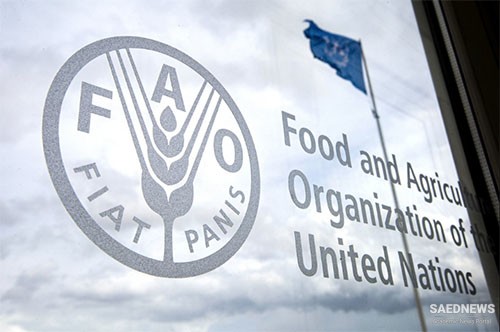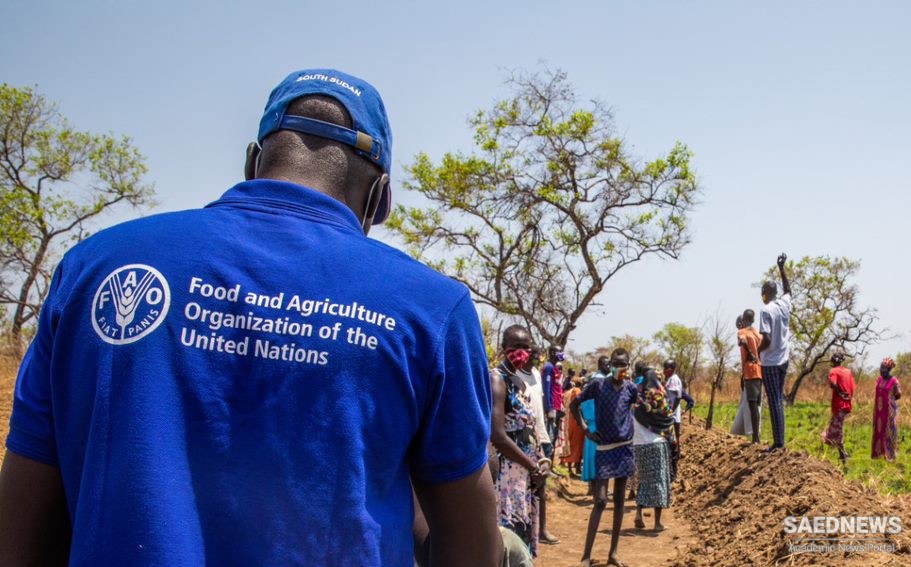The bold declaration adopted at the conference stated: This Conference, meeting in the midst of the greatest war ever waged, in full confidence of victory, has considered the world problems of food and agricul�ture and declares its belief that the goal of freedom from want of food, suitable and adequate for the health and strength of all peoples can be achieved. The first task the declaration identified after winning of the war was to deliver millions of people from tyranny and hunger. Thereafter, a concerted effort was needed to ‘win and maintain freedom from fear and freedom from want. The one cannot be achieved without the other’. But, the declaration also stated: ‘There has never been enough food for the health of all people’. Food production had to be ‘greatly expanded’, for which ‘we now have the knowledge of the means by which this can be done’. It required ‘imagination and firm will’ on the part of governments and people to make use of that knowledge. The declaration recognized that The first cause of malnutrition and hunger is poverty. It is useless to produce more food unless men and nations provide the markets to absorb it. There must be an expansion of the whole world economy to provide the purchasing power sufficient to maintain an adequate diet for all. With full employment in all countries, enlarged industrial production, the absence of exploitation, an increasing flow of trade within and between countries, an orderly manage�ment of domestic and international investment and currencies, and sustained internal and international economic equilibrium, the food which is produced can be made available to all people.
The primary responsibility for ensuring that people had the food needed for life and health lay with each nation. But each nation could fully achieve that goal only if all work together. The declaration ended: The first steps towards freedom from want of food must not await the final solution of all other problems. Each advance made in one field will strengthen and quicken advance in all others. Work already begun must be continued. Once the war has been won decisive steps can be taken. We must make ready now.
It became clear at an early stage of the conference that there was general agree�ment that a permanent organization in the field of food and agriculture should be established. It was also agreed that the organization should act as a centre of information and advice on both agricultural and nutritional questions, and that it should maintain a service of international statistics. The conference recommended the establishment of an Interim Commission in Washington, DC to draw up a detailed plan for the permanent organization for the approval of governments and authorities represented at the conference.
After two and a half years of preparatory work by the Interim Commission, FAO was established at the first FAO Conference in Quebec, Canada in October 1945 and Sir John Boyd Orr, ‘that brave persistent Scottish prophet, that pioneer in nutrition, that indefatigable researcher, that prophet of greater human welfare’, was elected as its first director-general (FAO, 1945). An executive committee of 15 members was also elected. Washington, DC was designated as the temporary seat of FAO but it was agreed that the permanent location should be at the United Nations on the understanding that that would also be the location of ECOSOC. Eventually, ECOSOC was placed in Geneva, Switzerland and FAO was located in Rome, Italy, where it inherited the library of the International Institute of Agriculture.
In his address to the conference after his election, Boyd Orr gave an indication of the vision of the ‘great world scheme’ he had for FAO, He noted that in the past forty years, science had advanced more than it did in the previous two thousand years to ‘let loose new forces into the world’. He added: those forces cannot be bottled up; they must either be harnessed to serve the ends of mankind, or they will break loose in a riot of destruction. How those forces are used will affect all nations equally. The world is now so small that any war will be a world war; and prosperity must be a world prosperity. Governments realize this, and they are, therefore, attempting to set up world organizations which will enable those powers of science to be applied on a world scale. It is very fitting ��� that FAO should be the first of these organizations. It deals with the primary products of land and sea; it deals with food – the primary necessity of life.
He went on: Each nation has accepted the responsibility ��� to provide, as far as possible, food and a health standard for all peoples. ��� But something new has arisen. All the governments have agreed to cooperate in a great world food scheme, which will bring freedom from want to all men, irrespective of race and colour. ��� If the nations of the world are going to get together to feed the people of the world, they must increase the production of the most important foods. In many cases that production must more than double. This will bring prosperity to agriculture ��� [which] must overflow into other businesses and into world trade. But ��� we do these things not because they will bring prosperity, but because they are right ��� if we put first things first, and do the things which we know to be right, a great many social, economic and political difficulties will disappear. ��� You say it is a dream. Then, it is the business of FAO to make that dream come true. ��� I am almost tempted to say that if this Organization succeeds it will perform a miracle. Well, we are living in a day of miracles.



 Native Americans' Lifestyle and Migratory Cuisine
Native Americans' Lifestyle and Migratory Cuisine














































